Build for Loving Balance: Fire and Water, Justice and Repair

Part of a yearlong series on Torah’s wisdom about building and builders in Jewish spiritual life.
This week’s Torah portion (Vayikra) is rich with sacrificial details. Animal body parts, kidneys and fat, and the altar on which they are burned — this is the stuff Leviticus is known for. This material can be tough for us as moderns. We may find the sacrificial system alienating and weird. But yesterday’s ways hold an important lesson for us as tomorrow’s builders: we must build in ways that balance, and uplift, the love inherent both in justice and in repair.
“You shall season your every offering of meal with salt; you shall not omit from your meal offering the salt of your covenant with God; with all your offerings you must offer salt” (Lev. 2:13). It’s a principle of classical Torah interpretation that nothing in Torah is extraneous. We can find (or make) meaning in every word, especially words or phrases that Torah repeats. So what’s up with the fixation on salt?
One response is that salt is a fixative – literally. In ancient days, salt was a primary way to make food last. So maybe Torah describes our covenant with God as a covenant of salt because salt represents what lasts. Our covenant is meant to last forever.
Another interpretation: tradition regards salt as a combination of fire and water. (Levi Yitzchak of Berditchev, d.1809, attributes this teaching to Ramban, d. 1270.) In a literal sense, salt is what happens when you apply fire to sea water — simmer away the water, and what’s left is the salt. But metaphorically, salt represents fire and water in balance.
A covenant of salt is a covenant of balance between fire and water. And fire and water, in turn, are understood by our mystics to represent justice and lovingkindness. (In the language of kabbalah, these are called gevurah and chesed.) Justice and lovingkindness are the two primordial qualities that our tradition imagines God balancing. Justice and lovingkindness are the tools with which God continually builds the world.
Like fire, justice is a flame that heats and illuminates, but without proper insulation fire can do harm. Like water, love wants to flow where it’s needed, but without proper channels flow can become a flood. Fire and water need to be tempered, balanced, channeled. That’s the first building lesson I find here. In God’s image, we must ensure that as we build we balance judgment and love, fixity and flexibility, container and flow.
This is the first building lesson in the first Torah portion of the book of Leviticus, which is where traditionally observant children begin learning Torah. It’s traditional to start not with the Genesis story of creating heaven and earth, not with the Exodus story of liberation, but with this.
Why does traditional Jewish pedagogy begin here? Maybe to signal from the very start the need to balance justice and repair, strong container and free flow. This balance is the energetic foundation of the spirit-infused society that Jewish tradition asks each generation to build.
This arises in the context of teachings about structuring a just society. Both before and after the verse about salt, Torah details animal offerings. First come offerings of wellbeing (“Thank You” to God), then offerings for ritual transgression, then offerings for interpersonal ethics missteps.
In this system, a wrongdoer must make restitution. (Torah speaks of monetary damages — for instance, restitution for fraud was value of the fraud, plus an additional fifth.) Only then would a wrongdoer bring an offering to be sacrificed. This offering would atone for the transgressor – wiping the spiritual slate clean (Lev. 5:24-25) – but only after restitution was made.
Notice how this process balances fire and water, justice and repair. First comes judgment (the process of discernment, paying restitution to make the injured party “whole”) – the zeal for right action that kindles our hearts like flame. Then comes the chance to make teshuvah and atone. That’s the work of repair and healing, the flow of divinity into and through our hearts like water.

Fire and water in balance. Judgment and repair in balance. They’re like left hand and right hand working together, one wielding a hammer and one holding a nail. They are two parts of a whole.
Critically, there is love in both. Both fire and water can convey love. Both justice and repair can reflect love. Olam chesed yibaneh (“I will build this world from love”), sings Rabbi Menachem Creditor from Psalm 89 – but healthy love takes many forms depending on the circumstance.
Building the world and the Jewish future with love means embodying both love in chesed and love in gevurah. It means building with Vayikra’s balance of justice and repair.
That balance is this week’s building lesson. Whether we see ourselves as walking in ancestral footsteps or in the Holy One’s “footsteps,” we’re called to build with balance. Each of us may lean more toward the “fire” of judgment or the “water” of repair, but Torah asks us to bring both qualities to bear always, and to manifest the love inherent in each.
To build an ethical Jewish future that’s worth our labor and our hope, we need this week’s Torah toolbox and its loving balance between justice and repair. It’s as basic to life as salt.


By Rabbi Rachel Barenblat. Sketchnote by Steve Silbert.

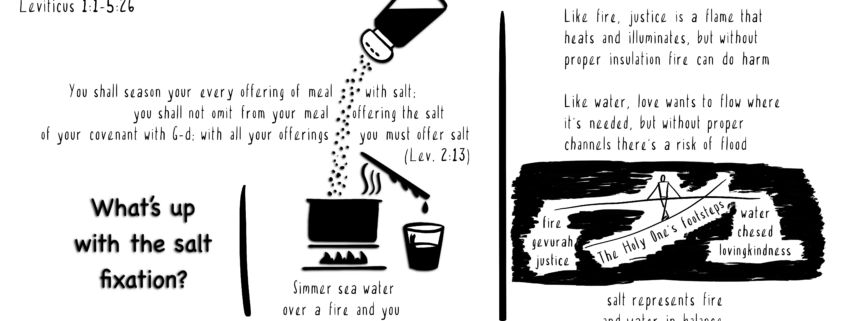

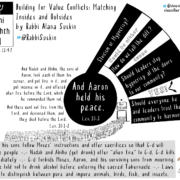
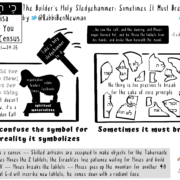
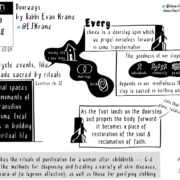
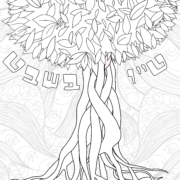



Trackbacks & Pingbacks
[…] 2019: Build for loving balance: fire and water, justice and repair (at Builders Blog) […]
[…] Build for loving balance: fire and water, justice and repair […]
Comments are closed.